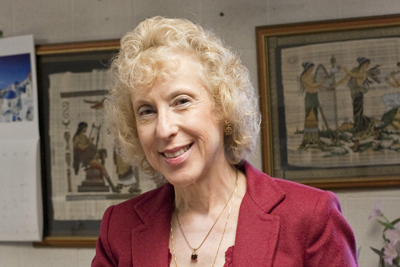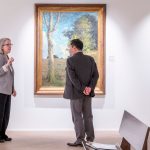
Diane Touliatos-Miles, Curators' Professor of Music at UMSL, edited the new book "Her Art: Greek Women in the Arts from Antiquity to Modernity."
University of Missouri–St. Louis musicologist Diane Touliatos-Miles edited a book that drops bombshells that are sure to shake up the status quo. The most controversial being that Homer did not write his epic poems “Illiad” and “Odyssey,” but that a woman did.
In “Her Art: Greek Women in the Arts from Antiquity to Modernity,” Touliatos-Miles brings together eight authors who write 10 essays that tell of the significant contributions of Greek women in the various genres of the arts.
UMSL Daily caught up with the Curators’ Professor of Music and director of the Center for the Humanities to discuss her new book.
Why did you want to coordinate this book?
Although I did not write this entire book, I took it on because I had previously published on the earliest woman composers in the history of music including, Kassia, the earliest with preserved music, for whom I have uncovered more than 50 compositions. So this theme, although not all music, was of interest to me.
In writing this book, we had the sisterly support of Olympia Dukakis, the Academy Award-winning actress, who was willing to write the foreword because of her Greek heritage, her interests in the arts and, most importantly, the significant historical information in the book.
What do you hope readers take away from “Her Art”?
The most important information is that Greek women from antiquity through the 21st century have always been active in the arts: visual arts of painting, sculpture, ceramics; music; drama; literature. But most often from the ancient through the beginning of the 19th century, these women were not acknowledged for their artistic contributions because their works were appropriated – borrowed and plagiarized – by their male counterparts, who had no qualms about placing their names on works that they never did.
Are you dropping a bombshell by writing that Homer was not the author of the “Iliad” and “Odyssey”?
You bet I am. Homer heard the women composer Phantasia of Memphis, Egypt, singing the stories of the “Illiad” and “Odyssey” when he visited there. He took these ideas back to Greece where he had his followers write them down because Homer was blind and could never write.
Of course there are many other bombshells, like Socrates. He had been tutored by Diotima of Mantineia, a philosopher who taught Socrates the so-called “Socratic” dialogue. Or there’s Kassia, the woman who was too brilliant to become empress.
The publisher, Peter Lang International Academic Publishers, describes “Her Art” as a discussion about Greek women in the disciplines of music, the visual arts, poetry and literature, film and theater, and history. The book is available at peterlang.com.














